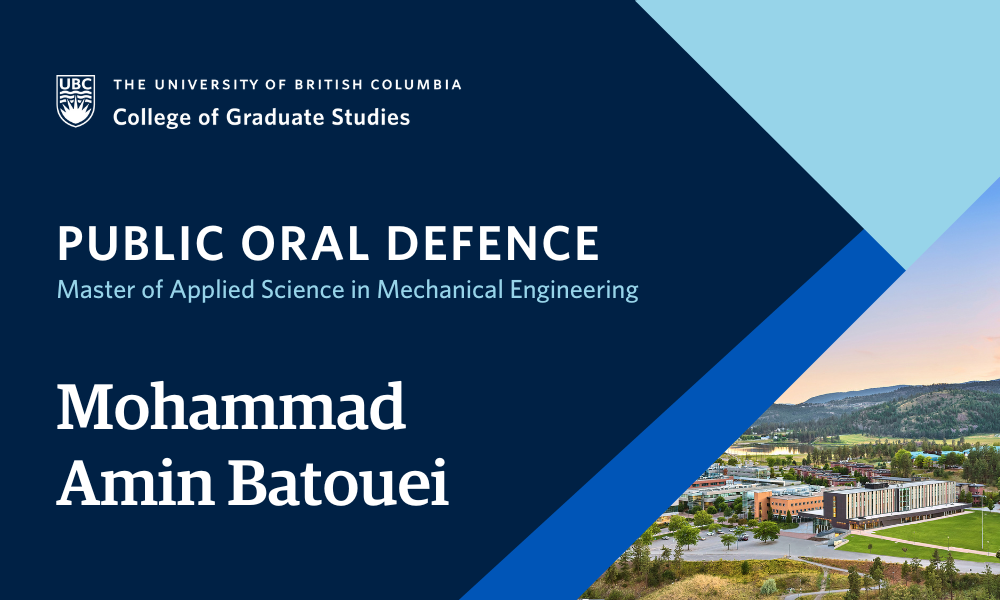
- This event has passed.
Thesis Defence: A Feasibility Study on Artificial Neural Network-Based Prediction and Optimization of Autoclave Curing Process Outcomes via Thermal Images and Haralick Texture Features
November 25, 2024 at 10:00 am - 2:00 pm

Mohammad Amin Batouei, supervised by Dr. Abbas S. Milani, will defend their thesis titled “A Feasibility Study on Artificial Neural Network-Based Prediction and Optimization of Autoclave Curing Process Outcomes via Thermal Images and Haralick Texture Features” in partial fulfillment of the requirements for the degree of Master of Applied Science in Mechanical Engineering.
An abstract for Mohammad Amin Batouei ‘s thesis is included below.
Defences are open to all members of the campus community as well as the general public. Registration is not required for in-person defences.
ABSTRACT
Composite materials are essential today in high-performance manufacturing industries due to their superior strength-to-weight ratios and versatility in design. However, maintaining consistent quality during their manufacturing processes, especially in the curing stage, still poses challenges to industries. The autoclave curing process, involving the application of heat and pressure to the prepreg material system, is known to have a substantial impact on the end-product mechanical properties. Unoptimized selection of temperature, pressure, and heat transfer coefficient (HTC) during this process can result in sizable product quality deviations.
This research using synthetic data explores the feasibility of Artificial Neural Networks (ANNs), combined with thermal imaging and Haralick texture features, to predict and optimize autoclave curing process outcomes. The proposed method is argued to be as opposed to off-line, fully simulation-based optimization techniques or experimental trial and errors, which have traditionally been used but may not be suitable for nearly real-time control and optimization of curing processes. The application of the approach is shown under three scenarios: an ideal condition with no uncertainties in thermal camera measurements (prediction mode; example 1), a practical implementation case where the latter uncertainties are considered (prediction mode; example 2), and finally a multi-objective design optimization case using genetic algorithms (reverse engineering mode; example 3). The SHapley Additive exPlanations (SHAP) sensitivity analysis is also employed to capture the contributions of different input factors (Haralick features) to the models’ predictions. The results of the first scenario demonstrated that ANN could accurately predict the key process outcomes, such as degree of cure (DOC) and cure time, with an accuracy of > 94%. In the second scenario, the DOC prediction accuracy exceeded 96%, along with a prediction error of a maximum of 1% for the minimum degree of cure (DOC) outcome. Additionally, in both scenarios, the models successfully predicted the gel time and cure time with a maximum error of 6%. A sensitivity analysis, in the second scenario, further confirmed the model’s robustness, with performance remaining stable despite simulated temperature measurement uncertainties. Particularly, when the simulated measured temperature data was largely perturbed, the accuracy remained above 0.84 across all outcomes. In the third (design optimization) scenario, the ANN-guided approach, combined with a genetic algorithm, identified an optimal solution along with closely estimated HTC values for the process. The optimization showed a strong potential for improving the curing process by balancing the trade-off between the minimum DOC and cure uniformity outcomes. Aligned with the emerging Industry 4.0 approaches, overall, this study highlights the potential of AI for improving on-site monitoring and process optimization of composite autoclave manufacturing via thermal imaging and associated feature extractions.